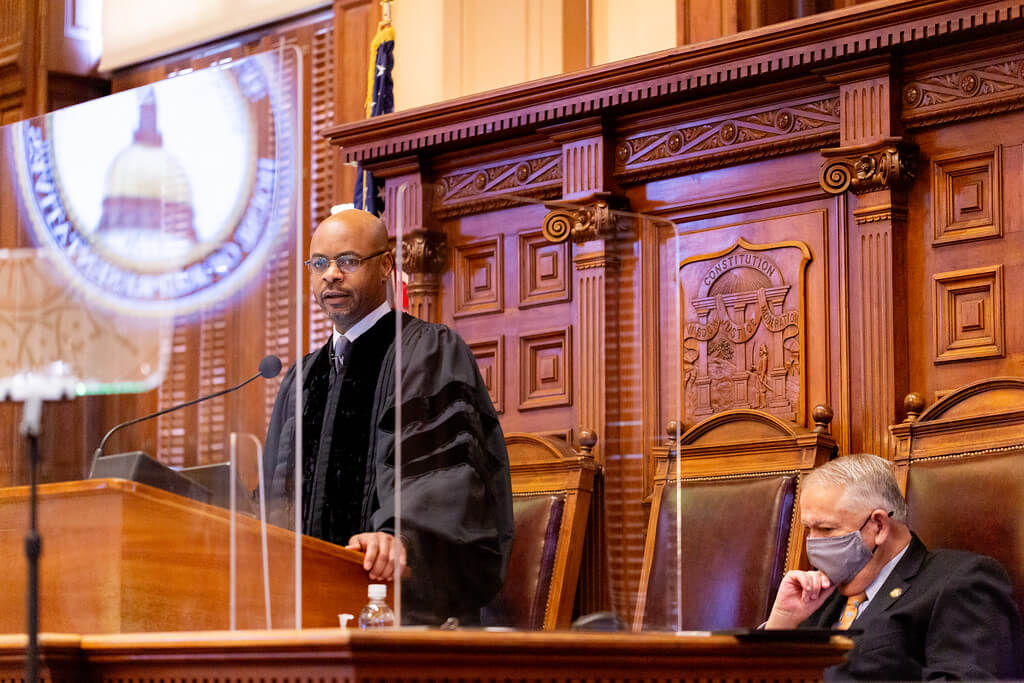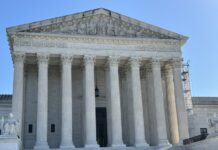
Outgoing Georgia Chief Justice Harold Melton brought his appeal for legislative help with a backlog of cases straight to lawmakers Tuesday during a speech that reflected on the last year’s challenges and heartaches.
Melton announced earlier this month that jury trials can resume in Georgia a year after he first ordered them suspended to avoid spreading the coronavirus in courthouses across the state.
“At first, we thought this pandemic would be over in a matter of months, and we would all go back to ‘normal.’ I certainly never envisioned that we would still be within its grips one year later,” Melton said.
Melton, who has served on the state’s high court for 16 years, announced last month that he would step down this summer, making Tuesday’s speech his last on the state of the judiciary address. Presiding Justice David Nahmias will take Melton’s place as chief justice.
Going a year without jury trials has created a backlog of criminal and civil cases that may take two or three years to tackle. On top of that, new safety protocols will likely slow down the process as jurors begin their return to courtrooms, potentially worsening the backlog. It will take more than a month just to summon jurors.
Gov. Brian Kemp has also now added judges and courtroom staff to the list of those eligible for a COVID-19 vaccine, citing the number of court cases piling up.

“Given the significant case backlog our courts are experiencing, we believe it is vital to get the third branch of state government back operating smoothly and safely,” Kemp said a press conference Tuesday.
The standstill has left many Georgians stuck in jail awaiting resolution. In Fulton County, the state’s largest court system, the number of people jailed without an indictment grew from 230 to about 1,400 in 10 months, Melton said.
The growing backlog has court officials bracing for a potential onslaught of speedy trial demands that Melton said could force judges to release some criminal defendants without a trial once the state-level public health emergencies end.
“We realize the burden of having defendants waiting longer for trial while being held in jail, but we need to have a system that actually determines whether people who have been charged and indicted with a crime are guilty or innocent before allowing them to walk free,” Melton said. “So we need your help to avert this crisis.”
The state Senate has already backed a bill that would temporarily suspend the state’s speedy trial requirements, which dictates deadlines and timeframes for moving a case along. The measure would expire in the summer of 2023.
The change would not affect a person’s right to petition for a speedy trial under the U.S. Constitution, but defense attorneys have voiced concerns that criminal defendants would be put at a disadvantage.
A House committee advanced the legislation Monday. The bill’s sponsor, Sen. Brian Strickland, said he was concerned that the backlog might create an opportunity for “folks to play games with filing demands” in hopes of having their case dismissed or to jump ahead of those already waiting in jail.
Another measure targeting the backlog that has cleared the House would give judges more leeway to hold court in alternative locations and allow judges to exercise their authority regardless of where they are.
The pandemic has had some judges resorting to non-traditional courtrooms, including a Cobb County judge who held court virtually from his bedroom – with an American flag behind him – when his son contracted COVID-19.
The shift to Zoom that has happened during the pandemic is probably here to stay for some court proceedings, like arraignments and plea hearings and status conferences for civil cases, Melton said.
“I want to emphasize that from day one of this emergency, Georgia’s courts have remained open,” he said. “And the work of the courts has continued. It looks different.
“Along the way, I’ve told judges if you have to stick a bucket inside the door of the courthouse to accept a filing and instruct that filer to kick that bucket back and forth in order to get things going, then do that,” he said. “We’ve adjusted our operations, and there are things we have not been able to do, but our courts have not closed.”
Melton also recounted the virus’s toll on the judiciary, including the deaths of three probate judges and a superior court judge who collapsed hours after holding a virtual court hearing from his home.






